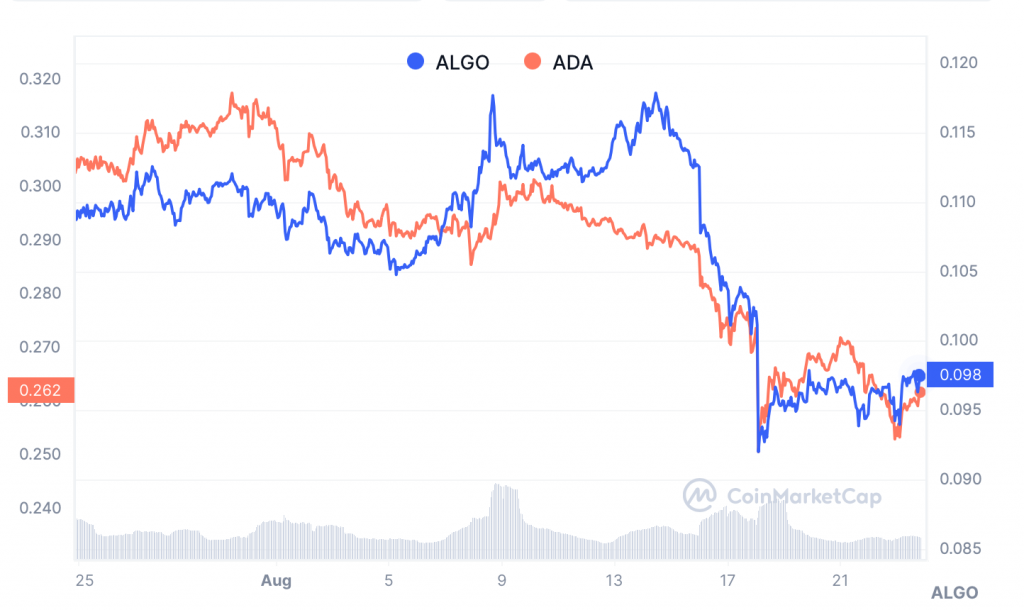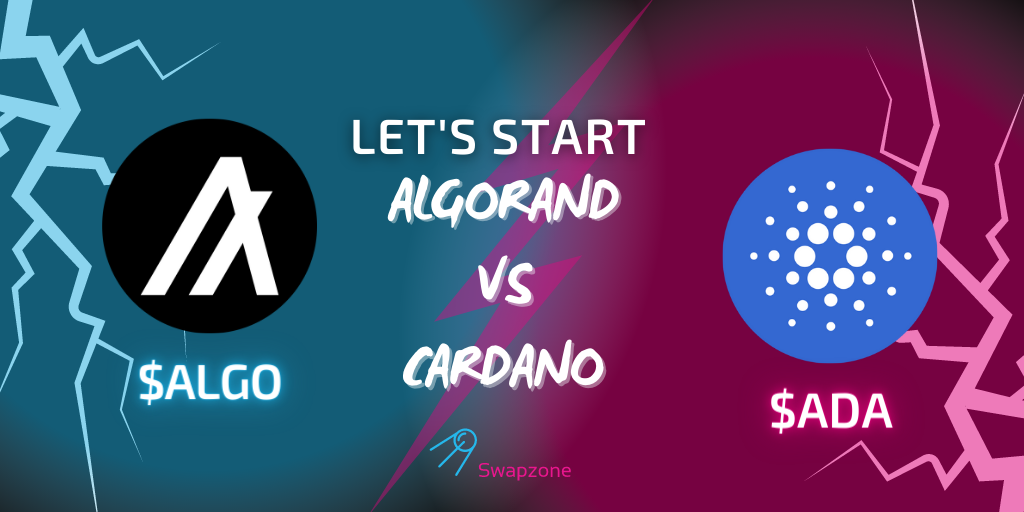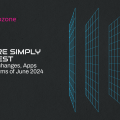Are you ready for a head-to-head showdown between the two heavy-lifters in the cryptocurrency market? In one corner, we have Algorand (ALGO), a blockchain platform that aims to revolutionize finance. And in the other corner, we have Cardano (ADA), a decentralized platform built for smart contracts and dApps. It’s ALGO vs ADA, and today we’ll dive deep into their features, benefits, and potential drawbacks. So grab your virtual boxing gloves as we explore who will emerge victorious in this clash of titans!
What is Algorand (ALGO)?
What is Algorand (ALGO)? It’s a question that many cryptocurrency enthusiasts have been asking lately. Well, let us break it down for you.
Algorand (ALGO) was designed to address some of the major challenges faced by traditional blockchains, such as scalability and security issues. With its unique consensus mechanism called Pure Proof-of-Stake (PPoS), Algorand aims to achieve high levels of decentralization while maintaining fast transaction speeds.
Its ability to handle large-scale transactions with minimal latency makes it an attractive option for applications requiring speed and efficiency, such as financial services and decentralized exchanges.
Algorand also emphasizes security. Algorand’s asynchronous Byzantine Agreement protocol ensures that all transactions are finalized with absolute certainty. The ALGO holders can participate in the consensus process and earn rewards by staking their tokens, reducing the risk of double-spending attacks and malicious behavior within the network.
The Algorand blockchain platform is scalable, secure, and decentralized. In the ever-evolving world of cryptocurrencies, Algorand has gained attention from investors and developers alike, making it one to watch. Keep an eye out for ALGO – it may just be the perfect time to invest!
Now it’s time to get to know the second competitor in our virtual ALGO vs ADA battle. Welcome… Cardano!
What is Cardano (ADA)?
Cardano (ADA) is a decentralized blockchain platform that aims to provide a secure and scalable infrastructure for the development of smart contracts and decentralized applications. Founded by Charles Hoskinson, one of the co-founders of Ethereum, Cardano takes a science-based approach to its development, leveraging rigorous academic research and peer-reviewed protocols.
One key feature of Cardano is its layered architecture, which separates the settlement layer responsible for handling transactions from the computation layer where smart contracts run. This design allows for greater flexibility and scalability in deploying complex applications on the network.
Furthermore, Cardano leverages a proof-of-stake consensus algorithm called Ouroboros. Unlike traditional proof-of-work systems that consume large amounts of energy, this algorithm offers a more energy-efficient and environmentally friendly approach to securing the network.
In addition to its technical innovations, Cardano also places great emphasis on governance and sustainability. It operates under a treasury system where ADA holders can propose and vote on protocol upgrades or funding initiatives.
Cardano sets out to address many of the scalability issues faced by other blockchain platforms while incorporating principles such as security, scalability, and sustainability into its core design philosophy. Its commitment to scientific rigor makes it an intriguing contender in the rapidly evolving world of blockchain technology.
Lately, there have been rumors surrounding Cardano in regard to the SEC’s increased scrutiny of several major crypto assets – calling them securities. In his latest interview with Corey Costa – a crypto enthusiast and a YouTuber with nearly 10K followers – Cardano’s founder Charles Hoskinson was asked whether Cardano could have any problems with the SEC following the news.
Hoskinson was firm in his reply:
“It’s very important to be accurate with our language, there’s no coming after Cardano.”
Could this be a sign of an even stronger future for Cardano? Only time will tell!
The next section of our ALGO vs ADA break-down is dedicated to specific problems each project seeks to solve.

What problems does Algorand (ALGO) solve?
The first platform among the ALGO vs ADA pair, Algorand (ALGO), is a blockchain platform that aims to solve several key problems in the cryptocurrency industry. As mentioned above, one of the main issues it addresses is scalability. Traditional blockchains often struggle with slow transaction speeds and high fees, making them impractical for mass adoption.
By utilizing a unique consensus mechanism called Pure Proof-of-Stake (PPoS), Algorand can achieve fast and secure transactions without compromising decentralization. This allows for a high throughput of up to 1,000 transactions per second, making it suitable for various applications such as financial services, decentralized exchanges, and supply chain management.
Additionally, Algorand addresses the issue of token distribution fairness through its innovative auction-based approach known as the “Algo Auction.” By giving everyone an equal opportunity to participate in acquiring ALGO tokens at a fair market price, Algorand promotes inclusivity and prevents concentration of wealth among early adopters.
Algorand’s focus on scalability, security, and fairness sets it apart from other blockchain platforms and positions it as a strong contender in the crypto space.
What problems does Cardano (ADA) solve?
The second competitor among ALGO vs ADA, Cardano, is a blockchain platform that also aims to solve several key issues in the cryptocurrency industry. One of the primary problems it addresses is scalability. Cardano seeks to overcome scalability issues by using a layered architecture that separates its settlement layer from its computational layer.
Another problem that Cardano tackles is interoperability. In the current crypto landscape, different blockchains operate in isolation, making it difficult for them to communicate or share information seamlessly. Cardano aims to create an ecosystem where various protocols can interact and collaborate effectively through its smart contract platform.
Cardano takes into account not only technological aspects but also economic and social factors when making decisions about protocol upgrades or changes. By prioritizing long-term viability and involving all stakeholders in decision-making processes, ADA seeks to ensure fair representation within the network.

How to swap ALGO vs ADA with Swapzone?
Swapping ALGO vs ADA with Swapzone is a breeze, allowing you to conveniently exchange your Algorand and Cardano tokens for other cryptocurrencies. Here’s how it works:
1. Visit the Swapzone website: Start by heading over to the Swapzone platform. It’s a user-friendly and intuitive interface that makes swapping ALGO and ADA a seamless experience.
2. Select your currencies: On the homepage, you’ll find two dropdown menus. Select ALGO or ADA as the currency “You Send”. Then choose the cryptocurrency you want to receive in return from the “You Get” section, for example, Bitcoin (BTC).
3. Compare rates and fees: Once you’ve chosen your currencies, Swapzone will display a list of available exchanges along with their rates and fees. You can compare them side by side to find the most favorable deal for your swap.
4. Choose an exchange: Analyze different options based on minimum and maximum amounts, processing time, and user ratings before selecting an exchange.
5. Provide recipient address: Enter your wallet address where you want to receive the swapped coins securely.
6. Confirmation & Finalize swap: Double-check all details thoroughly before confirming the swap transaction. By utilizing Swapzone’s services, swapping ALGO vs ADA has never been easier or more efficient! Give it a try today!
The Verdict: Who’s the Winner?
Now that we’ve explored the key features and advantages of both Algorand (ALGO) and Cardano (ADA), it’s time to answer the burning question – who is the winner in this ALGO vs ADA battle? Well, it ultimately comes down to your personal preferences and specific needs.

If you value scalability, speed, and a robust consensus mechanism, then Algorand (ALGO) might be your top choice among the two. Its pure proof-of-stake protocol ensures fast transaction processing with minimal energy consumption. Additionally, its ability to support smart contracts opens doors for developers looking to build decentralized applications on a scalable infrastructure.
On the other hand, if you prioritize research-driven development and an academically rigorous approach to blockchain technology, then Cardano (ADA) could be the winner for you. With its focus on formal verification methods and layered architecture design principles, Cardano aims to provide a secure platform that meets regulatory requirements while empowering individuals through financial inclusion.
Both projects have established partnerships with industry leaders and boast strong communities of supporters. They are continuously striving towards innovation and improving their respective platforms. Therefore, it would be unfair to declare an absolute winner in this comparison as each project brings unique strengths to the table.
When making a decision between ALGO vs ADA, it’s important to consider your specific use case requirements along with factors such as network effects, ecosystem maturity, governance models, and developer activity levels.
In conclusion, both Algorand (ALGO) and Cardano (ADA) offer promising solutions within the blockchain space. Regardless of which one emerges as your preferred option based on your individual needs or investment strategy, supporting these innovative projects contributes towards advancing decentralization.

